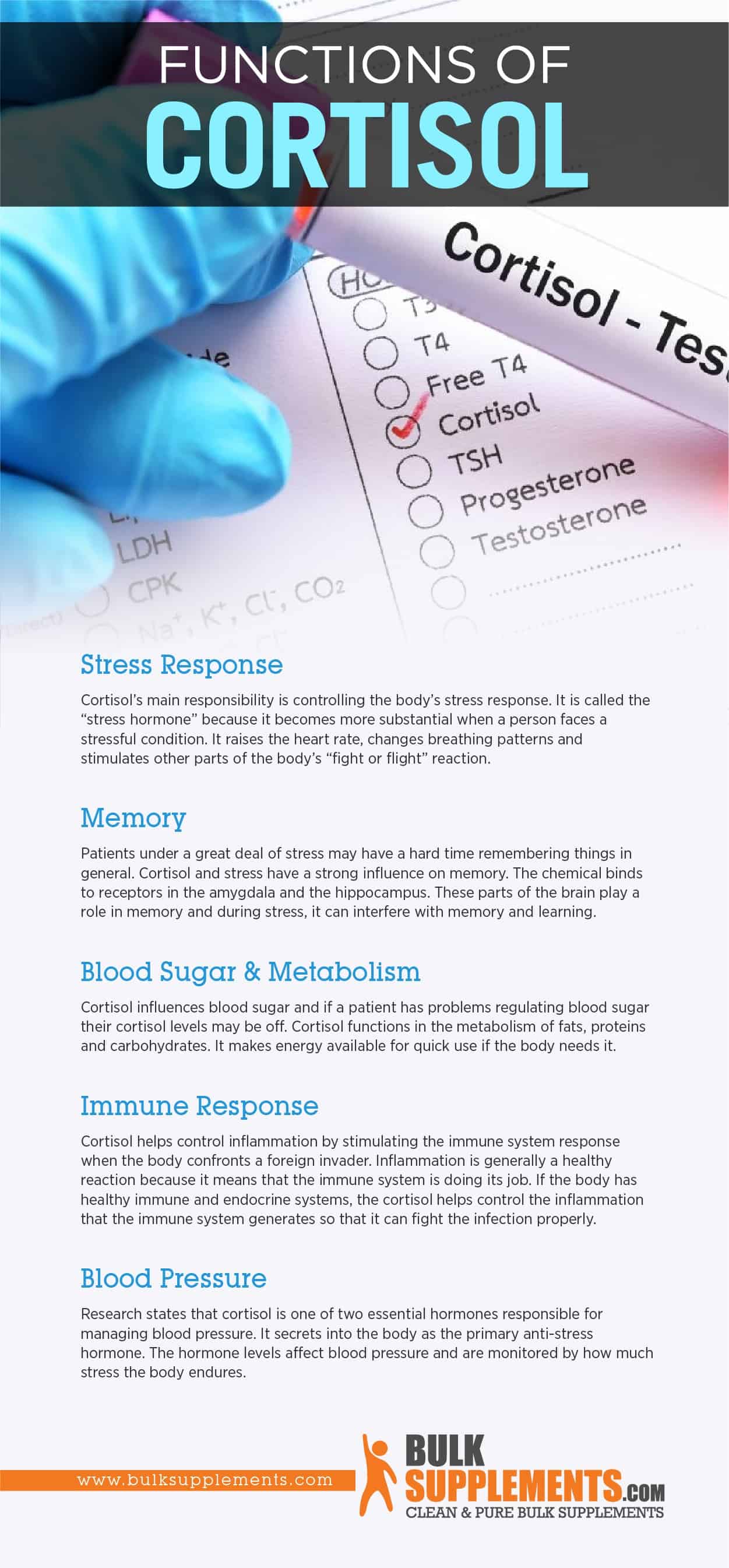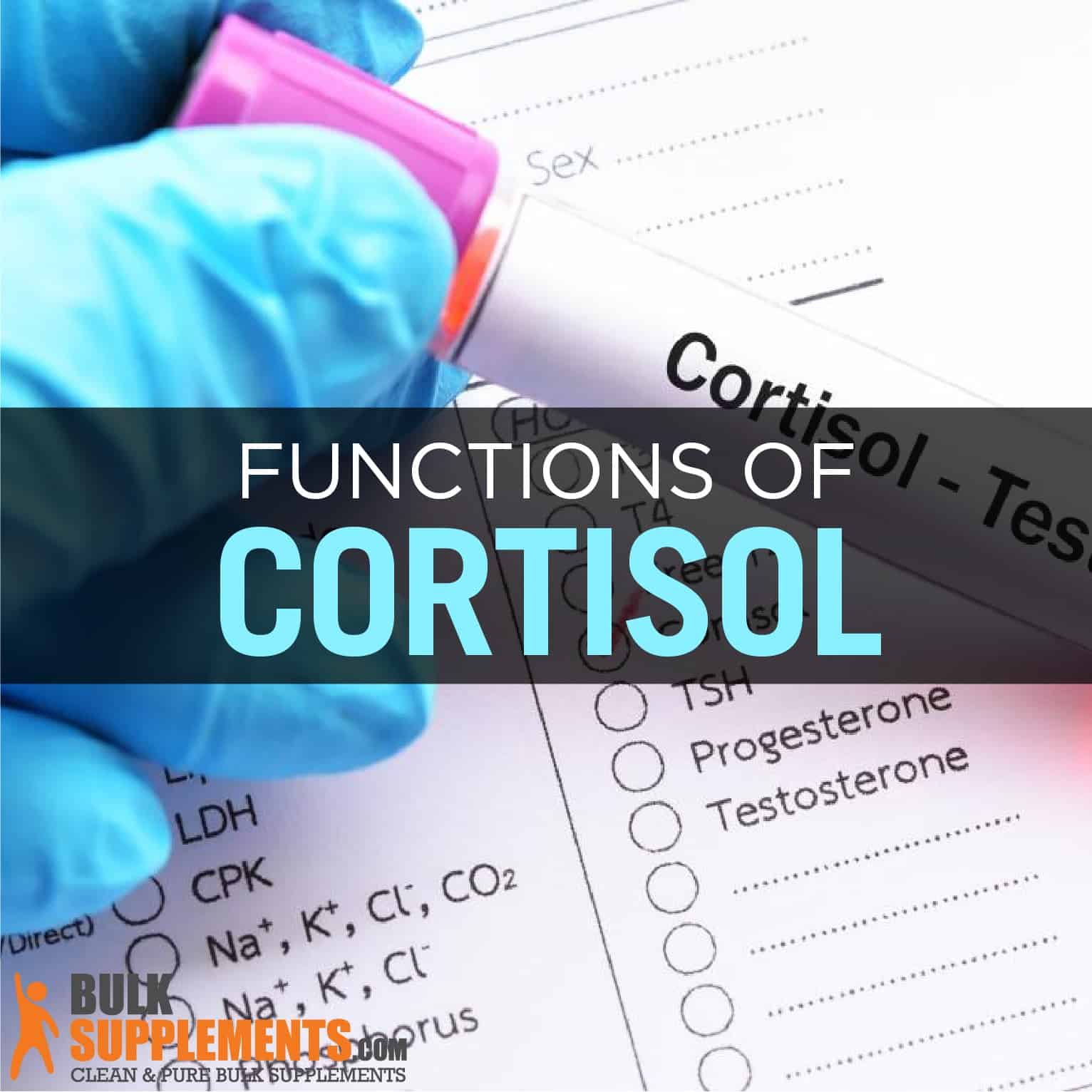By: Kenna McHugh
What is Cortisol?
Cortisol is the body’s primary stress hormone. It works with certain parts of the endocrine system to control fear, mood and stress. When there are high cortisol levels in the body, it can cause problems (x).
What is the Endocrine System?
The endocrine system is a vital network of organs and glands in the body. Like the nervous system, for example, it performs a crucial role in regulating and managing multiple body functions. Neurotransmitters and nerve impulses are part of the nervous system that allows communication within the nervous system. But the endocrine system operates differently by using chemical messengers called hormones instead. When an external or internal factor upsets hormone levels, it can damage different functions in the body.
Components of the Endocrine System
At the tip of the kidneys are the adrenal glands, shaped like triangles, and they produce cortisol, which is categorized as a steroid hormone or glucocorticoid. Glucocorticoid controls fat metabolism, carbohydrates, protein and anti-inflammatory action. It also instructs the liver to synthesize the amino acids and fatty acids it stores and releases as glucose and glycogen (x).
Positioned at the base of the brain are the pituitary and the hypothalamus glands. They sense cortisol levels in the blood. If the level is too low, the glands make the necessary adjustments to the level of hormones they produce. The adrenal glands register the signals from the two glands and adjust the amount of cortisol the body needs (x).
What are the Functions of Cortisol?
Stress Response
Cortisol’s main responsibility is controlling the body’s stress response. It is called the “stress hormone” because it becomes more substantial when a person faces a stressful condition. It raises the heart rate, changes breathing patterns and stimulates other parts of the body’s “fight or flight” reaction (x).
Memory
Patients under a great deal of stress may have a hard time remembering things in general. Cortisol and stress have a strong influence on memory. The chemical binds to receptors in the amygdala and the hippocampus. These parts of the brain play a role in memory and during stress, it can interfere with memory and learning (x).
Blood Sugar & Metabolism
Cortisol influences blood sugar and if a patient has problems regulating blood sugar their cortisol levels may be off. Cortisol functions in the metabolism of fats, proteins and carbohydrates. It makes energy available for quick use if the body needs it (x).
Immune Response
Cortisol helps control inflammation by stimulating the immune system response when the body confronts a foreign invader. Inflammation is generally a healthy reaction because it means that the immune system is doing its job. If the body has healthy immune and endocrine systems, the cortisol helps control the inflammation that the immune system generates so that it can fight the infection properly (x).
Blood Pressure
Research states that cortisol is one of two essential hormones responsible for managing blood pressure. It secrets into the body as the primary anti-stress hormone. The hormone levels affect blood pressure and are monitored by how much stress the body endures (x).

What Are the Effects of High Cortisol Levels?
When the endocrine system is in top shape, the blood usually has high cortisol levels in the morning and levels are at their lowest at night. However, if there are irregularly high cortisol levels it can affect several parts of the body. For example, weight gain and low passion are two potential effects of high cortisol levels because the hormone plays a role in stress response and metabolism (x, x). It can also lead to specific health conditions, such as Cushing’s syndrome. Symptoms can differ depending on what’s creating the rise in cortisol levels (x).
High Blood Pressure
Because cortisol plays a role in managing blood pressure, patients with high cortisol levels may be at risk for hypertension or high blood pressure. In turn, this condition also increases risk for kidney damage, stroke or heart attack. Research discovered that an increase in cortisol levels may also raise blood pressure and unusually high levels of cortisol over a long period can lead to hypertension (x).
Suppressed Immune System
When the body experiences a lot of stress over a long time, cortisol regulates the stress response, so the body can handle it. As a result, the hormones that the immune system needs to protect the body from bacteria or viruses decreases. Thus, if a patient is under a lot of stress, the immune system weakens and does not fight off infections and diseases as effectively (x).
Anxiety & Depression
Because cortisol plays a big role in regulating the body’s stress response, irregular cortisol levels can lead to an increased risk for depression. Research states that patients who struggle with or who are at risk for depression show patterns of chemical disturbance in the brain. In a study, the patients had higher cortisol levels after a during their recovery period after they came in contact with the stressor (x).
Similarly, anxiety is a mood disorder that research associates to hyperactivity in the brain, specifically in the hypothalamic-pituitary-adrenal (HPA) axis. Research states that elevated cortisol levels play a role in anxiety because the brain is overactive, affecting the stress response (x).
Irregular Menstrual Cycles
During the menstrual cycle, the body undergoes various shifts in hormones that cause both physical and psychological changes. There is a significant relationship between stress and the reproductive system. Irregular cortisol levels can interfere with regular ovulation and menstruation because this hormone can suppress other reproductive hormone levels (x). For example, high cortisol levels may cause abnormal ovulation, anovulation (lack of ovulation), amenorrhea (lack of menstrual period) and even increase the risk for premature birth (x).
Metabolic Syndrome
Metabolic syndrome is becoming more common and it increases the risk for severe health problems. It is a collection of conditions that a patient develops together and increases the risk for heart disease, stroke and type 2 diabetes. When the body has high cortisol levels, it suppresses the natural flow of hormones in the body. Research links metabolic syndrome to chronic stress and abnormal activity in the hypothalamic-pituitary-adrenal axis which controls the stress response (x).
Natural Herbs & Vitamins to Reduce High Cortisol Levels
Patients may be able to take natural herbs and vitamins to help reduce high cortisol levels and help manage associated health conditions. However, supplements do not cure any health condition or disease on their own. Instead, they are designed to give the body what it needs for optimum health potential. All patients should consult with a doctor before trying any supplements because they may cause side effects and interact with medications (x).
Ashwagandha
Ashwagandha is an herbal extract that people have used for centuries as a natural anti-inflammatory. Some researchers believe it may help with bone and joint pain and mental health. It has been used for more than 5,000 years in India and Africa to help with stress and anxiety. The recommended dosage for ashwagandha extract powder is 450 mg one to three times daily, or as directed by a physician (x).
Fish Oil
Fish oil is loaded with health-benefiting properties that may lend support to the cardiovascular system. According to research, the natural components in fish oil may help maintain healthy blood pressure, cholesterol levels and body weight with a balanced diet and exercise. These properties can also support the skin, have potential anti-inflammatory effects and may help fortify the joints. Its properties can also help promote muscle growth and boost athletic performance. The recommended serving size is two fish oil softgel capsules two to three times a day (x).
Vitamin C
Vitamin C is an indispensable vitamin, known for its influence on the immune system. The vitamin naturally circulates through the human body and activates white blood cells that fight off disease and infections. Vitamin C also helps naturally fortify collagen and assists in repairing damaged tissue. As a dietary supplement, the recommended serving size for vitamin C/ascorbic acid powder is 1,000 mg, with a doctor’s approval (x).
L-Theanine
Patients often take L-theanine for its calming effect that may help regulate mood and sleep. These effects may also aid in alertness, focus, cognition and memory. It can also offer a boost to immune capacity and support the cardiovascular system. The daily dosage for L-theanine powder is 100 to 250 mg one to three times a day, with a doctor’s approval (x).
Magnolia
Magnolia is a flowering plant with over 200 species that grow throughout the world. The extract is abundant in antioxidants and has potential anti-inflammatory properties that protect the body from damage and disease. According to research, magnolia also helps promote healthy skin and contributes to a healthy mood. The recommended dosage for magnolia extract powder is 1,600 mg daily with meals, or as directed by a physician (x).
Rhodiola Rosea
Rhodiola rosea is an arctic plant used for centuries for its health benefits. According to research, it may help support mood and mental health and encourage healthy metabolic function. The suggested dosage for rhodiola rosea extract is 400 mg once or twice daily, with a doctor’s approval (x).
The Bottom Line
Cortisol is a natural hormone that the body uses as part of the endocrine system. This system releases hormones to send chemical messages throughout the body and to the brain. The body needs cortisol to maintain the stress response and metabolic function, but high cortisol levels can be dangerous. High cortisol levels may result in irregular menstrual cycles, metabolic syndrome and a compromised immune system (x).


